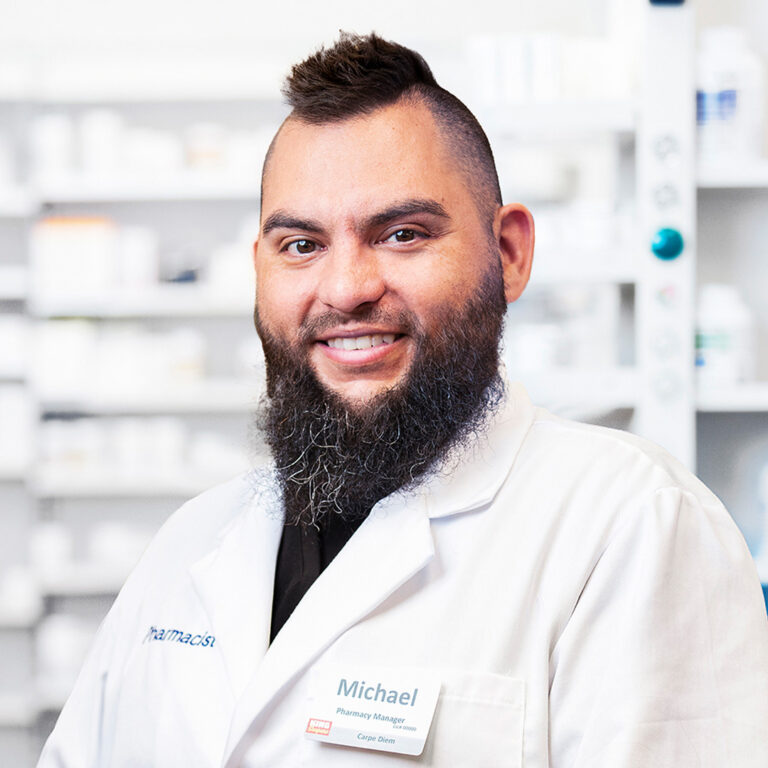2022 Winners

Education
- Doctor of Pharmacy, University of Colorado – CU Skaggs School of Pharmacy
- Bachelor of Science in biochemistry and molecular biophysics and molecular cellular biology and Bachelor of Health Science in physiology from the University of Arizona
Resume
- 6 years as pharmacy manager at King Soopers
- 2 years as pharmacist at King Soopers
- 4 years as pharmacy intern at King Soopers
- 2 years pharmacy technician at Fry’s Pharmacy
Years in pharmacy
Praise from customers
“Michael has helped me navigate the drug system. He went above and beyond to help me save on prescriptions. He was very patient with me, and he is always happy to see me, which means a lot.”
Notable achievements
2019 Health Pulse Award for Operational Excellence
Michael Anthony Ortega Jr., Pharm.D., a pharmacist at King Soopers in Greeley, Colorado, takes his role as a patient educator seriously. That’s why he was named Best Pharmacist for Patient Education.
While patients are often quick to brush him aside when he asks them if they have questions about their medications, he persists anyway.
Case in point: Dr. Ortega recently dispensed an asthma inhaler to a patient. He said he didn’t have any questions about the medication because he’d been taking it for years. Dr. Ortega told him that while the instructions say he can take two puffs at a time, it’s better if the puffs are spaced about a minute apart.
“I try to find little things about the prescription that the patient may not know, that can profoundly change the therapeutic outcome or the patient’s experience with the drug,” he says.
Dr. Ortega doesn’t just educate people in front of his counter, he educates those behind it, too. Despite being a relatively new pharmacist himself, he regularly mentors pharmacy students who rotate in and out of his pharmacy. One of the most important things he does, he says, is listen—not just to what his staff and students say to customers, but how they say it. Because tone and nuance, he says, can impact whether someone feels heard and valued or dismissed. Bedside manner is just as important in pharmacy, Dr. Ortega says, as in medicine.
Here, we spoke with Dr. Ortega about his role as an educator and his work in the pharmacy.
What inspired you to become a pharmacist?
I started my undergrad career in the sciences, specifically chemistry and biology, and I knew I wanted to do something along those lines. I was deciding between med school and pharmacy school, but the big thing that pushed me into pharmacy school was the lack of blood. Sometimes I get a little queasy with blood, and I figured that a person showing up to an ER wouldn’t appreciate their physician passing out on them.
What’s a typical day like in your pharmacy?
We start filling prescriptions for people and then, we just take it as it goes. Sometimes there’s a lot of vaccinations that come in. (We’re starting to gear up for influenza now.) On top of all that, in Colorado, pharmacists have prescriptive authority for birth control and Narcan, a drug used to treat opioid overdoses. I do have some women coming in who need refills on birth control and I’ve been able to provide Narcan to some patients on opioids. Pharmacists’ prescriptive ability is still relatively under-advertised.
What do you do to educate your patients?
Patient education is a large component of my daily activities. We focus on offering medication education—things like administration techniques and potential adverse reactions—to every patient when they pick up their prescription.
I always try to add an extra point of counsel that some healthcare providers might not go over. For example, I might go up to a patient and say, “Do you have any questions about your asthma inhaler?” And they’re like, “Nope, I’ve been on it for 15 years,” or “The provider told me everything about it.” A lot of inhalers are one to two doses every four to six hours or whatnot. You’re allowed to use up to two puffs at a time, but, I always counsel them to separate those two puffs by about a minute or so, so that they maximize each dose. It astounds me how frequently people respond to that counsel with “I never knew that.”
Patient education is a large component of my daily activities … I always try to add an extra point of counsel.
I just try to find little things that are important about the prescription, but that may have been missed and that can profoundly change the therapeutic outcome or the experience the patient has. The education and advice I provide are intended to assist the patient in achieving the desired therapeutic outcome, which ultimately leads to a healthier life.
Are you involved with mentoring pharmacy students at all?
Yes, I’m a preceptor at the University of Colorado and the University of Wyoming. I think mentoring students is a very good way to ensure continuity of the profession. I’ve only been in the profession as a pharmacist for eight years now. I’m still a relatively new pharmacist. But, prior to becoming a pharmacist, I was a technician. Meaning, I’ve gone all the way from technician to management. I think that kind of experience is important, especially in the retail setting. Retail is definitely not for everybody, but it’s important to show the next group of pharmacists what retail can be.
What’s your favorite customer story?
A couple of years ago my father flew into Colorado from Arizona for a college football game. My dad had never been out of state for a college game, and although he didn’t go there, the University of Arizona is his team. I got tickets on the 50-yard line, about seven rows up. It’s not a giant stadium, but we get there and two rows in front of me is one of my patients. We saw each other and said hello. He turned around and said to my dad, “Your son is one of the best pharmacists I’ve ever had.”
What drives you to go above and beyond for your customers?
I view every interaction as a puzzle. I throw everything that I’ve learned at the situation. That usually manifests as going above and beyond, but to me it’s just using all the tools I have to get the problem solved in its entirety.
I think mentoring students is a very good way to ensure continuity of the [pharmacy] profession.
For example, I’ll look to see if there are manufacturer coupons available, if the drugs can be on autofill, if the patient is caught up on vaccinations, or if they can benefit by getting a 90-day supply of their medications.
I like to simplify health care for my patients and help them live healthier lives. Sometimes that means just listening to them: After I’ve finished going over their new prescriptions, I let them bend my ear about their medication, or their health, or just what’s going on in their lives.
About a year ago, I changed locations and I had a number of patients follow me across town. That was actually quite humbling.
What’s the most rewarding part of your job?
The most rewarding part of my job is when the state board comes through and says your pharmacy is looking good and we can’t find any deficiencies. Or it’s when I look and see that all the prescriptions have been typed up, or all of the prescriptions have been released, or you don’t have a line of five people at 5 o’clock during rush hour. Basically, it’s knowing that the job is getting done.
How do you get involved in your community as a pharmacist?
I’ve helped out at vaccination clinics at places like retirement homes and I’ve talked about polypharmacy (using different medications to treat one ailment) and pharmacy in general at an Aging Mastery program event for senior citizens. I’ve had a couple of people who didn’t utilize my pharmacy, but they called me with drug interaction questions, or just questions in general, after hearing me talk.
What does being nominated for this award mean to you?
This nomination was a complete surprise. It’s very humbling for me because I feel like I just show up for work and do my job. I didn’t know there were awards like this out there, so this means a lot, actually.
Praise from customers
“Michael has helped me navigate the drug system. He went above and beyond to help me save on prescriptions. He was very patient with me, and he is always happy to see me, which means a lot.”
Notable achievements
2019 Health Pulse Award for Operational Excellence

